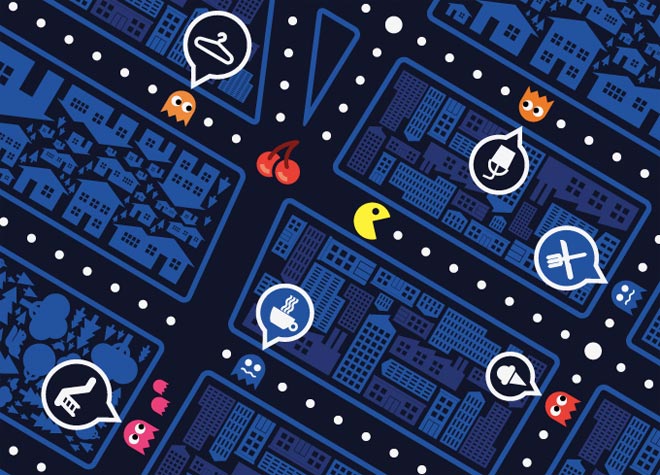wired连线:Foursquare更具社交性游戏应用特质
2004年一个阳光明媚的春日,27岁的丹尼斯.克劳利(Dennis Crowly)参与了一个名为曼哈顿小精灵的项目。克劳利装扮为Pac-Man(吃豆人),穿着黄色的衣服在佛里街奔跑,躲避鬼魂。该项目是经典街机游戏《吃豆人》的现实扮演。一个支持团队记录下克劳利的行动,追踪鬼魂,并给克劳利指出强力豆子的位置。最后在第五大道附近,克劳利被“鬼魂”逼到了绝境。
纽约时报这样形容该项目:“数字世界与物质性世界融合的生动画面。”
6年后,使用克劳利联合开发的Foursuqare应用程序,克劳利的位置在餐馆中被记录(“Check in”)。与许多使用GPS的移动社交应用相同,Foursuqare允许用户向朋友和陌生人播送他们的位置,反之亦然。有时,当用户走进一家餐馆,商场或者旅店的时候,以前的游客会留下一些小提示(如燕麦使这里最好吃的东西!)。一条放置于“虚拟门垫”(Foursquare)之下的数字说明。
Foursquare更像一个游戏。参加这个游戏的人被鼓励成为地理“童子军”(Boy Scouts),收集他们到过地方的优点徽章。用户通常收集咖啡馆,百货超市和地铁站的徽章,而收集一定数量的徽章可以使其成为这些地点的“市长” (“mayor”)。克劳利表示,这是一个竞争异常激烈的应用。喜欢收集徽章的用户行动起来很容易。而且对占领“市长席位”的人来说很有好处。
当用户拥有一个具有GPS功能的设备时,其身份的确认不是一个“什么人,什么事,在哪里”的问题,而是一个“在哪里,什么事,什么人”的问题。通过首先指出位置,这些应用转变了互联网本身的伦理标准。此前,互联网历来不强调地理位置,它不会将引起你兴趣的地理位置当做重要的事。
Foursquare最美妙的事情是,用户在一些地方发生的事情,其它用户已经记录过。陌生人通过名字和名字的最后一个字母被确认。如果他们允许链接,用户甚至可以前往他们的Facebook页面偷看。
对Foursquare和它的竞争对手来说,创造一个优美的,温暖的方式去打破现实世界的坚冰是一个挑战。有一些建议是,当其发现附近有人在播放某首音乐时,Foursquare能够提醒用户。用户可以发现相同品味的人,并展示自己装载的移动音乐。相互比较可能会引起短信交流。
Foursquare将成为比《曼哈顿吃豆人更》酷的游戏。(source:wired/techweb)
One sunny spring day in 2004, Dennis Crowley was running down Waverly Street dressed in yellow, avoiding ghosts. Crowley, then a 27-year-old grad student in New York University’s Interactive Telecommunications Program, was participating in a class project called Pac-Manhattan, which used the streets of Greenwich Village for a grueling physical version of the classic arcade game. He was Pac-Man, and—despite a support team that was logging his movements, tracking ghosts, and directing him to power pills—people dressed as Pac-Man spooks eventually cornered him near Fifth Avenue.
The New York Times described the experience as “a kind of tableau of digital convergence with the physical world.”
Six years later, Crowley and I are sitting in a NoHo cafè pecking at our iPhones. Using Foursquare, an app Crowley cocreated, we are “checking in” to the restaurant. Like many mobile social applications that use GPS, Foursquare lets you broadcast your location to friends and strangers—and, of course, it lets you see where they are, too. Sometimes, when you check into a restaurant, store, or hotel lobby, a previous visitor will have left a tip (“Oatmeal is great here!”)—a digital note tucked under a virtual doormat.
But Foursquare is more like a game than a newsfeed. Participants are encouraged to become geographic Boy Scouts, collecting merit badges for the locations they rack up. The most frequent visitor to a given coffee shop, department store, or subway stop gets to be its “mayor,” a designation that’s worth a lot to some. “It’s a hypercompetitive app,” Crowley says. “The badges are good for people who like to collect. And the mayorships are good for people who are territorial.”
Power may flow to whoever racks up the most visits to a given Starbucks, but there’s another way in which Foursquare and its kin change how we see ourselves. When we’re holding a GPS-enabled device, our identity isn’t a question of “who, what, where.” It’s a question of “where, what, who.” By putting location first, these apps transform the ethic of the Internet itself, which has traditionally held that it matters not where your fanny is planted.
But the neatest thing about Foursquare is what happens when you’re at some location where other users have checked in. Strangers are identified by first name and last initial. If they have allowed the link, you can even peek at their Facebook pages. So you eyeball the crowd in the restaurant, nightclub, or highway rest stop and try to figure out who’s who. Suddenly, real life is like visiting some dungeon in World of Warcraft.
Greeting a stranger in WoW, of course, is painless and socially acceptable. A challenge for Foursquare and its competitors is to create a graceful, noncreepy way to break the ice in the scary real world. Otherwise only reckless adventurers or nutcases would opt in. Here’s one idea: a feature that alerts you when it finds simpatico music on the playlist of someone nearby. You could then ping that tasteful person and reveal what mobile tunes you’re loaded with. A match could lead to texting—testing out whether a conversation (or song sharing!) is called for.
That would be an even cooler game than Pac-Manhattan.








































 闽公网安备35020302001549号
闽公网安备35020302001549号